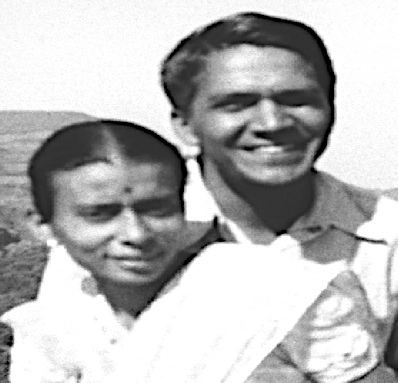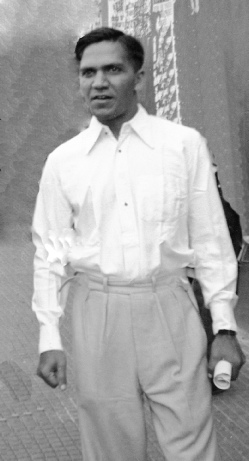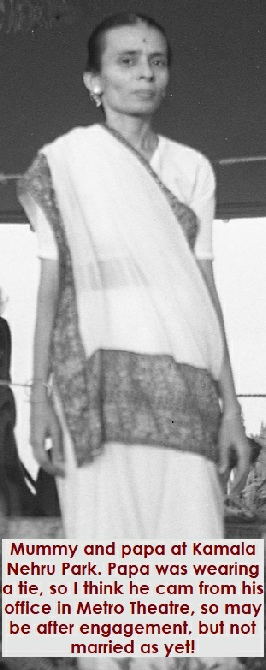
|
Amod and Gajera were his childhood homes. Jambusar was hometown, and held clan lunches. (not dinners, no electricity then!) Transport was bullock carts for the ladies, and feet for the brave hearts! The family would leave Amod at 4 am for the 8 mile journey. Gajera was nearer, but I don’t have any story from there. My uncle claimed that they skipped dinner the previous evening, so that they could gorge on the laadu or laapasi and buru at the clan lunch. (laapasi is split wheat, and buru is powdered sugar). What was it like at that time? Milk was 2 pai a pound, ghee was 2 anna’s a pound. (the traditional measure was a ser – roughly equal to a British pound:lb.) He went barefoot till he was in class 4, and trousers almost when ready to leave school, else it was half pants all the way! There is a funny story about this. The family was in Surat by then, and there was to be an Inspection in the school by an education department official. All the children had been warned to dress well for the inspection. Papa managed to spill something on his shirt as he was off to school, and since a spare shirt would have been an anachronism in that household, he grabbed the only garment he could lay his hands on. It was his dad’s “dagalo” a knee length coat! At the inspection, the official was walking around, and all the kids were standing up! He came to papa, saw the coat to his ankles, and asked “are you wearing anything underneath?” so papa lifted up the hem of the coat to show his shorts! As it happens to most of us, some phrase or sentence overheard at the most unexpected of moments registers in ones brain and memory for eternity! Papa would go along on his sister’s pilgrimages around Gujarat. A favourite place for her was Mount Abu. They would get a room at a “dharamshala” – a public charity funded inn for pilgrims – and while the ladies slept inside the room, he would stretch out on the verandah outside the room. There was some spiritual discourse going on nearby, and papa could hear the speaker in the quiet of the night. He heard “sleep and food can be reduced or increased at will!” This truism registered, and he reduced his food intake from 25 rotali’s to 5 the next morning onwards – to the day he got dentures in his 70’s! Same place, same situation, and another registered phrase! The discourse was on The Bhagavat Geeta, but a colloquial version recited and explained by a traditional bard. “One needs to labour for life, and one also needs to labour for dharma (dharma is essentially to be interpreted as spiritual duties – not rituals!). With this realisation, just labour at whatever comes your way, there is nothing for you to loose!” This became a platform for his value system throughout life, and set me a “duty first” mind- Papa went to “see” the girl – his prospective bride – that his family had identified as a possible match. He was already early 30’s, and past his bachelor shelf life! The girl was mummy, of course. He wore a brand new pyjama (which constituted the formal gujarati dress for social occasions). It was so new, that the cloth mill it came from had put a stamp on the cloth saying “for local use only”, and after getting the pyjama stitched, that stamp was clearly visible! Mummy still married him!! Mummy too was past eligible bride shelf life, but was a working woman – a teacher, no less! By the social standards of the early to mid 40’s, both were late to the alter! Papa had a childhood friend – neighbour, playmate, schoolmate - Surat influenced papa’s life significantly, as his most formative years were spent in Surat. Some of his closest friends are from those Surat years. One such friend: “Jainti” – real name I suspect was Jayant or Jayantee – was the youngest in a family that was known as Nagarsheth! A wealthy landed gentry. Their mansion was in the same lane as papa’s family’s residence. The older brother was a patron of Hindustani Classical music and a mentor and promoter of musicians of this genre. He would regularly hold “bethaks” – private recitals, by young and upcoming – but not yet there – musicians, who later in life became world renown Hindustani Classical artistes. Papa had picked up a fondness for this genre of music, but he was not allowed to go up to the recital floor – the older brother’s domain! He would sit on the verandah and listen to the recitals. Inner Surat in the 20’s and 30’s was a very quiet place, so, he would hear the conversations, analysis of the recitals and so forth. He was an enlightened listener! He learnt to swim in the Taapi river flowing past Surat. No coach, no training, just jump in, thrash around, and may be a friend or two give tips and encouragement. There is a Hanuman temple on the banks of the Taapi near their house. Friends would gather there, climb on to various parts of the temple, and jump into the river. Papa did it once too often, and got himself a tiny hole in his eardrum! That ear was always a bit hearing deficient. Once, he laid hands on someone’s rowboat, and took off into the river. Currents and lack of skills saw his boat getting dragged off towards the sea, which is not far off from Surat town. (It was the port that the British came to). Fortunately, his boat hit a sand bank, and was rescued by some fishermen perhaps the next day! I cant remember too many of his college days stories. MS University, then Bombay University at Poona in SP college for his BSc, and then Kolhapur for his BT – Bachelor of Teaching. A few stories from his Poona days, though. The address for his SP College was “opposite the Zarapkar tailoring college”! He picked up contract bridge skills and played tennis there as well. But, I think some friend would drag him off to be the fourth player in a game of contract bridge at the Poona(?) Club, and someone else would ask him to be a sparring partner for a game of tennis – he had no club money or even inclination. The bridge games would involve money, but his host would take care of that. Papa was firm that he would never play cards for money! He had played cricket in Surat, and represented his clan too, but he never got into football or hockey (after he got whacked on his shins during a hockey game). One lingering activity of his was hiking in the Saihyaadri hills amongst the Shivaji forts and forests surrounding them. In his life time, I think he had climbed all of Shivaji’s forts, many of them more than once! No stories from Kolhapur! |
She had an artistic bent of mind, and excelled at embroidery, knitting and painting – besides sewing clothes. I recall that we had a serving tray – which to my great shame, has been lost in our move to Singapore – with an embroidered still life picture of roses – each with absolute life like colours and shades. She had also embroidered a picture of a young lady kneeling and offering an oblation to some deity with a lamp and flower – done entirely with her own hair. She would preserve her hair whivh shed during a head bath, and used that collection like threads! I was told that she was a plump child – which would be hard to believe if anyone saw her as an adult – moringa pod (Sharagavaa ni shing!) thin. But the plump girl child was called “Bakaa”, short for Bakaasur I assume! And the name stuck. She was always “Bakaa: ben, maasi, foi” to the pre marriage family. She had a smooth way of getting people to do things her way. Inter-
|
 પહેલું પાનું The Beginning
પહેલું પાનું The Beginning
| ઓળખાણ |
| લગ્ન પહેલાં |
| ૧૯૫૬ સુધી |
| મમ્મી પછી |
| હિમાલય |
| આખરે અમે બે |
| સંબંધો |
| તૈયારી |
| તિજોરીવાળા |
| શાહ કુટુંબ |
| મિત્ર મંડળી |
| ડુંગરાવાળા |
| ચકલાવાળા |
| ગઠિયા મંડળી |
 All the stories of papa’s younger days have come from his sister or brother – both older than him – who subsequently lived with us for quite some time.
All the stories of papa’s younger days have come from his sister or brother – both older than him – who subsequently lived with us for quite some time.